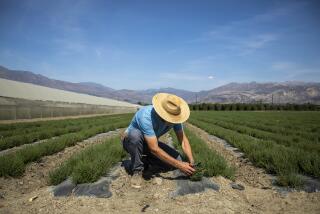Ecological Impact of GM Crops
- Share via
* The Times calls for more public debate about genetically modified crops (editorial, March 9). Allow me to examine your statements that GM crops are popular “because they alter natural ecology” and that there are “distant risks” that they will “alter ecosystems.”
Agriculture is an ecologically destructive industry. On millions of acres, natural ecosystems have been replaced by managed ones. Long before GM crops came on the scene, natural plant and animal communities were replaced by crops genetically quite different from their wild ancestors and grown largely as monocultures. Wide hybridization between crops and weeds produced some troublesome weeds. Human population growth and, by extension, traditional agriculture (and that includes organic farming) are responsible for the tremendous loss of biodiversity we have experienced in the past 100 years.
Will GM crops lessen or heighten the environmental impact of agriculture? They will almost certainly lessen the impact. Crops genetically engineered with genes that make proteins to kill only specific insects require fewer pesticide applications; as a result, fields of these crops have more insects and a greater diversity of insect species, including beneficial ones. Crops engineered with herbicide-tolerant genes require less tilling of the land (hence there is less dust and soil compaction). These crops are used in combination with the more biodegradable herbicides, rather than the nastier ones that persist in our ecosystems. The biggest advantage will come from raising crop productivity (whether through GM crops or by other means), because it will mean that more wilderness can be preserved when, in 50 years, there are 9 billion of us.
MAARTEN J. CHRISPEELS
Director, UC San Diego Center
for Molecular Agriculture






